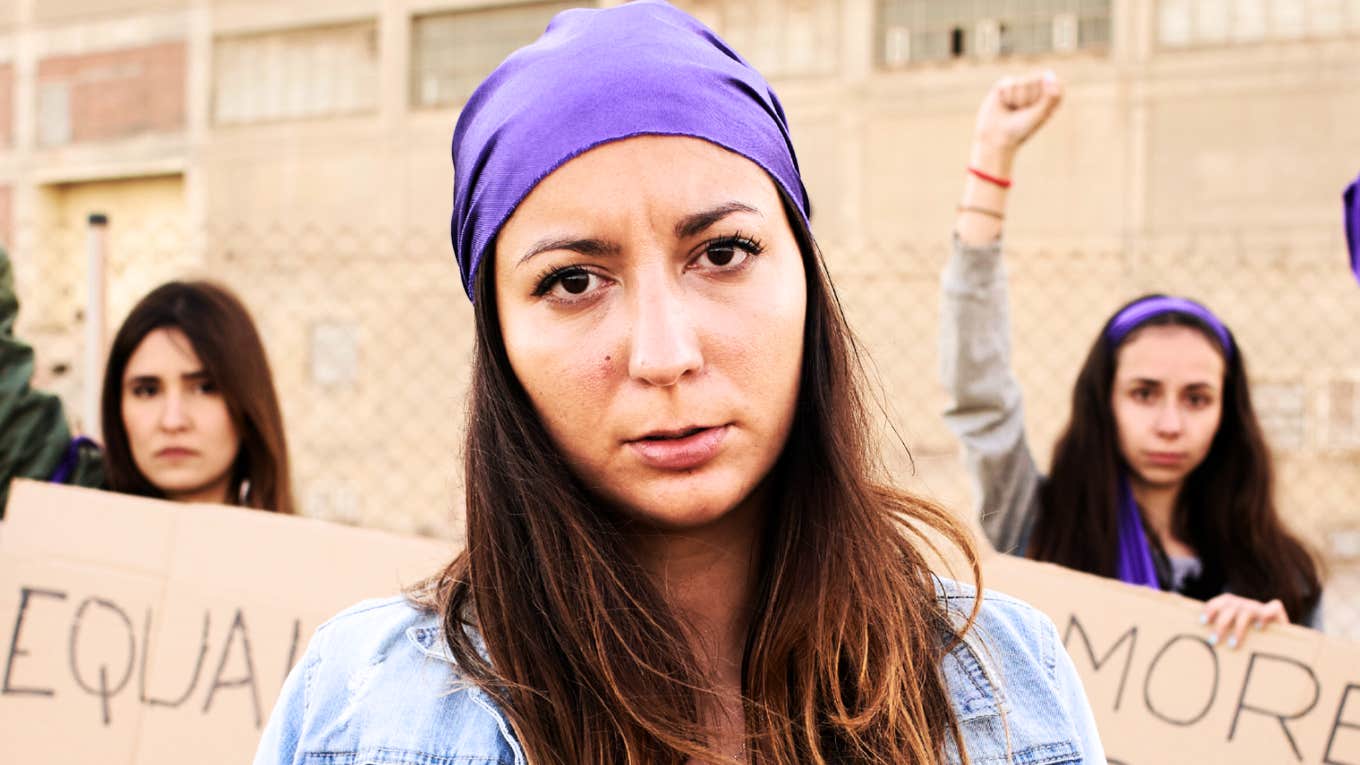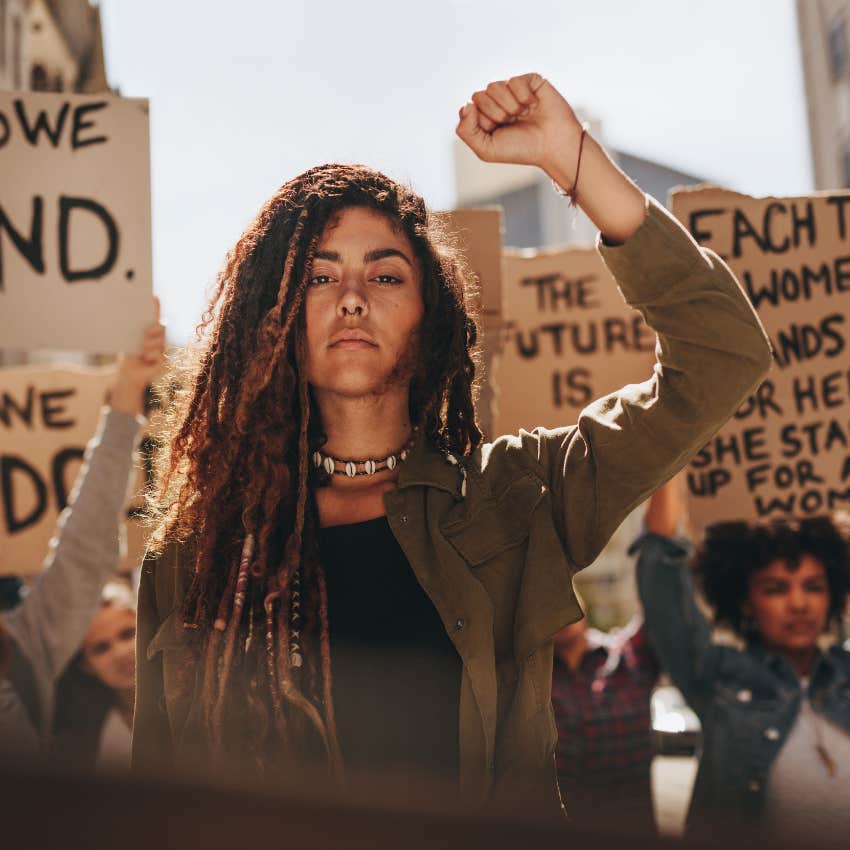Should Feminists Care About Male Suffering?
Feminism fights for equality, but where does that leave men's pain?
 Imágenes de Carlos Barquero | Canva
Imágenes de Carlos Barquero | Canva Men, I’ve heard, aren’t doing too well. They are lonely. They are depressed. They are underemployed, undereducated, and underloved.
As a woman, I have empathy for male suffering because I have empathy for all human suffering. Yes, suffering is part of life, but I’m of the humble opinion that we are all doing far too much of it, particularly considering how many resources and how much knowledge we have at our disposal. I also have empathy for male suffering because there are boys and men in my life whom I love very much. It’s hard to see anyone I love suffer, especially when they shouldn’t have to. So yes, as a human, I care about male suffering.
As a feminist, I also care about male suffering because no one "wins" the fight for social justice when there is still unnecessary human suffering.
 Brian A Jackson / Shutterstock
Brian A Jackson / Shutterstock
Feminism is not, and never has been, about women “winning” at the expense of men.
Perhaps this is why I struggle with some of the conversations we’re having about male suffering right now. At one extreme, of course, there’s the manosphere, which I struggle with for obvious reasons. These dark, frothing corners of the Internet exploit male suffering by stoking rage and making women the target.
It is women who perpetuate oppression by scheming between our pillow fights to trample all over all the privileges and entitlements the world owes to men. Men are victims, and to overcome their victimhood, they need to drink lots of protein shakes, buy fancy cars, abuse and exploit women, and then whine online about women not being nice to them.
That’s one conversation, I guess we’re having. I struggle with it not just as a feminist, but as a mother whose stepson was lured into the manosphere for a time. These ideologies, I’ve learned the hard way, are alarmingly accessible, within reach for any male who is feeling angry, confused, or left behind, and who is looking to make sense of it all.
While the manosphere may seem extreme, it just reinforces messages about masculinity that our boys and men have been absorbing since birth. It’s a backlash movement; it’s nothing new. What’s new is the speed and vigor with which its messages can spread and the rabbit hole of social media- and AI-fueled disinformation that lends them an air of legitimacy.
Then there are more nuanced, progressive conversations about male suffering being had — what I dub the “Richard Reeves conversations,” like this one on The Daily Show with the actual Richard V. Reeves. A core tenet of this conversation, and Reeves’ book, Of Boys and Men: Why the Modern Male Is Struggling, Why It Matters, and What to Do About It, is that we can care about male suffering and care about gender equity. Just because men are part of the problem doesn’t mean they aren’t hurting, too.
I can’t say I disagree. Reeves has done his research. I don’t doubt the statistics he cites or most of the claims he makes about male isolation and depression.
But, there is a but. While conversations like these are certainly not about men bulking up and dominating women, there still lurks a “man vs. woman” subtext. And this, my friends, is where we lose the plot.
It’s been said many times before, but I’ll say it again: The patriarchy hurts men, too.
The pressure to maintain power over women, or to patronizingly protect us, by exercising “masculine” ideals like competition, aggression, and emotional detachment, is the source of most of the male suffering that Reeves bemoans.
For added context, let’s examine a related system of oppression: white supremacy. Just as the patriarchy hurts men, white supremacy hurts white people. The entire notion of race was intentionally perpetuated by colonial landowners to keep the poor divided and concentrate power and wealth for a select group of elites.
We can acknowledge that white supremacy hurts white people while also acknowledging that the primary goal of dismantling white supremacy is not to “solve” white suffering, but to achieve racial equity and liberation. If we can attain a world without racial prejudices, privileges, or power differentials, we’ll all be better off.
Like male suffering, white suffering has been a central theme of recent presidential elections, and the right has leaned into it enthusiastically, exploiting white anger to advance an agenda that doesn’t benefit any of us. The left has been less enthusiastic, but there is a growing sector that believes we need to “focus more” on men and the white working class, that we’ve ignored their suffering at our own expense.
Reeves himself protests this zero-sum thinking but still promotes a binary mentality that ignores the interconnected nature of our suffering. He paints “male problems” into a separate corner that he says deserves more of our resources and attention. On The Daily Show, he says:
“How do we talk about the rising suicide rates among men, the falling wages among men, the troubles that boys are having at school… how do we do that in a way that makes sure that we don’t in any way let up the work we still need to do for women?”
But what Reeves fails to acknowledge is that this is the same work.
Alongside Reeves’ concerns about boys falling behind in school, he feels the need to point out that girls are doing great.
“In the education system now,” he says, “we have huge gender gaps favoring girls and women.” Reeves then suggests some incremental solutions to the problem of boys and men underperforming in school.
I can’t say I disagree with the solutions he proposes. I started my own son a year later in Kindergarten in part because he would have otherwise been one of the youngest boys in his class.
Like Reeves, I was aware of the developmental differences between boys and girls at younger ages and believed he would be more socially and emotionally equipped for kindergarten at age six. Like Reeves, I also believe we need more male teachers (like my father), particularly in preschool and elementary school, and I would heartily support any effort to this effect.
But in promoting these incremental solutions, let’s not lose sight of the end goal. The end goal of dismantling the patriarchy is not restoring previous levels of male academic achievement.
We don’t need more male teachers just because boys need more male role models. We need more male teachers because to dismantle the patriarchy, it’s imperative to show all children that supporting, educating, and caring for our rising generations is a collective pursuit that holds intrinsic social and economic value.
These aren’t parallel struggles; they are struggles that are all tangled up in one another. When women have equal access to positions of influence, we can help set the tone for a less violent culture, a more cooperative economy, and a more caring society. When care work is no longer disproportionately assigned to women, men will have more access to emotional connection and the many social rewards of caregiving.
When we can all be paid equitable wages, when we can take breaks from paid labor without severe repercussions, when we can access the social support we need to care for children and our fellow humans, I can guarantee you that male depression will be curbed, male loneliness will dissipate, and male suicide rates will plunge.
So. Back to the manosphere. Reeves rightly points out that the manosphere lures in lonely and depressed males by acknowledging their suffering and offering a clear villain: women. Especially those vile feminists.
But in the same interview, Reeves also, more subtly, criticizes feminists by implying that our general stance is: “Men don’t have problems. Men are the problem.” To be clear, he says “some people” have this stance, but you don’t have to read too far between the lines to understand which “people” he’s referring to.
And again, Reeves loses me here. I read a lot (like, A LOT) of stories and books by feminist writers, both on Substack and beyond, and what I see, time and time again, is not a lack of empathy for men, but a call for accountability.
What I see, time and time again in feminist circles, is not women actively villainizing men, but women asking men, begging men, to be part of the solution instead of part of the problem.
 Jacob Lund / Shutterstock
Jacob Lund / Shutterstock
Yes, I have my critiques of certain sectors of the feminist movement. None of us are doing this work perfectly because it’s impossible to do this work perfectly.
But the idea that feminists and other progressives are perpetuating male suffering by denying it is wildly inaccurate. Most women I know are screaming at men from the rooftops: “We want you to make more friends! We want you to be more vulnerable! We are desperate for you to understand emotional labor and take on more of it!”
We know men have problems. We see these problems manifest in our fathers, our brothers, our partners, our sons, our coworkers, our friends. And when these problems manifest in the form of violence and abuse, as they so often do, we also suffer the consequences.
The Richard Reeveses of the world claim to be “reframing” debates about gender, but their efforts fall short. They are telling people, women in particular, to care more about the problems of men, as though women haven’t already spent centuries tending to the needs and wounds of our boys and men.
They don’t need to be telling women to care; we already do. Aboriginal and women’s rights activist and academic Dr. Lilla Watson famously said, “If you have come to help me, you are wasting your time. If you have come because your liberation is bound up with mine, then let us work together.”
What Reeves needs to do is take his message one step further, making it abundantly clear that the suffering and liberation of men are intricately tied to the suffering and liberation of women.
We can never lose sight of the patriarchy as a power structure that is fueled by artificially imposed gender disparities and is designed to actively oppress significant portions of our population.
That gender equity doesn’t live “over there,” apart from the problems of men. That equity and liberation across the gender spectrum will address the problems of men, and lead to less suffering for us all.
Kerala Taylor is an award-winning writer and co-owner of a worker-owned marketing agency. Her weekly stories are dedicated to interrupting notions of what it means to be a mother, woman, worker, and wife. She writes on Medium and has recently launched a Substack publication, Mom, Interrupted.

